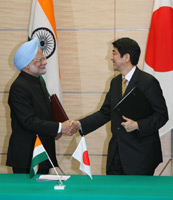An Indo-Japanese entente in Asia has been a much-discussed, but somewhat amorphous proposition -- till now. China’s increasingly belligerent posture in the South China Sea and the perceived decline of overall U.S. influence has managed to focus minds in both Tokyo and New Delhi. Japan, in particular, is now quite keen to greatly expand maritime and defense cooperation as a part of a much deeper relationship. The emerging security partnership between the two Asian powers is underpinned by a larger geo-economic convergence of interests. Japan and India are both moving to put in place a strategic economic structure that can enrich both sides while maintaining the Asian balance of power.
Former Japanese Premier Shinzo Abe recently remarked on a visit to New Delhi that “with its plans of having a three-aircraft-carrier navy, India can keep the Asian sea lines stable, and such a step can assure Vietnamese, Americans and South Koreans, if not the Chinese." This ringing endorsement of an Indian role in Asian waters comes at a time when India and Japan are operationalizing the maritime security cooperation agreement they signed in 2008 by regularizing joint anti-piracy patrols, combat exercises and service exchanges. Gone, too, are inhibitions about exercising jointly with the U.S. Navy -- Japan seems set to become a regular participant in the Indo-U.S. Malabar series of war games. As Abe put it, "Let us work even more closely together with the U.S., Australia and other maritime democracies to invest in building a robust, open, liberal and safe and stable East Asia Summit-led Asia."
But the Indo-Japanese security relationship is now moving beyond force synchronization on the seas and war gaming with the U.S. It seems Japan has agreed to shore up India’s dual-purpose technological base. The most visible symbol of this has been Japan’s removal of several key Indian defense research laboratories from its banned entity list. Indian defense research through the years has essentially been constrained by the lack of a mature industrial base. Being able to source components from Japan can go a long way in addressing this problem.

